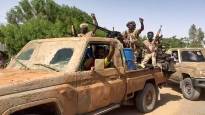The internal conflict in Sudan is spreading. At first, the army and the paramilitary forces clashed with each other, now the ethnic groups have also started feuding.
The tenuous ceasefire concluded in Sudan ends at midnight. Sudanese and international observers are waiting to see if the ceasefire can be extended.
Clashes between the Sudanese army and the paramilitary group RSF broke out on April 15. There have been gatherings in different parts of the country. So far, at least 512 people have died in the fighting and more than 4,000 have been injured.
The already bad humanitarian situation in Sudan has collapsed as a result of the fighting. More than two out of three hospitals have closed. In many cities, people have had to lock themselves in their homes to be safe. Because of this, they suffer from food, drink and electricity shortages.
On Monday, a three-day ceasefire was concluded through the United States. It definitely reduced the fighting, but not completely.
There have been fierce battles at least in the capital Khartoum and in the western Darfur region, where the city of Geneina with half a million inhabitants has been at the center of violence.
It is feared that the violence will expand
The situation in Khartoum is said to be chaotic. of the Guardian magazine (you will switch to another service) according to the residents, the electricity and water have been out for ten days already. At the same time, the city is terrorized by young men wielding assault rifles and machetes, who are robbing stores.
In Khartoum, it is said that bodies are lying in the streets, some of the houses are burning. Today, the Sudanese Air Force has carried out airstrikes on the positions of the RSF forces.
In the Darfur region, the situation is a little different, he says, for example al-Jazeera news channel (you will switch to another service). In Darfur, people fear the arrival of RSF forces.
The RSF was formed at the time from the Janjaweed forces that tormented Darfur. The Janjaweed forces consist mainly of Arabs, who have committed extensive human rights crimes in Darfur since 2003. The targets of the atrocities were the Central African ethnic groups of Sudan.
Now the Central Africans are gathering weapons to be able to defend themselves if the RSF starts to become active in Darfur. The local police force has no power to intervene. Instead, the army has distributed weapons to the residents. They have also been obtained by storming police stations, reports al-Jazeera.
Will the negotiations continue?
Commander of the Sudanese army Abdel Fattah al-Burhan has agreed to hold talks in South Sudan’s capital, Juba. There has been no response from RSF to the invitation for negotiations, reports the Guardian.
According to the army, Sudan’s neighboring countries South Sudan, Kenya and Djibouti have drawn up a motion to continue negotiations.
Tens of thousands of foreigners have been evacuated from Sudan. Neighboring countries fear that hundreds of thousands of Sudanese will flee the country.
The external powers stress that evacuation must now be given less attention and the main focus must be on the humanitarian aid given to the people of Sudan.
According to the UN’s estimate, the unrest that started in Darfur alone has made it difficult to send aid to 50,000 children who were already suffering from malnutrition before the start of the fighting.
